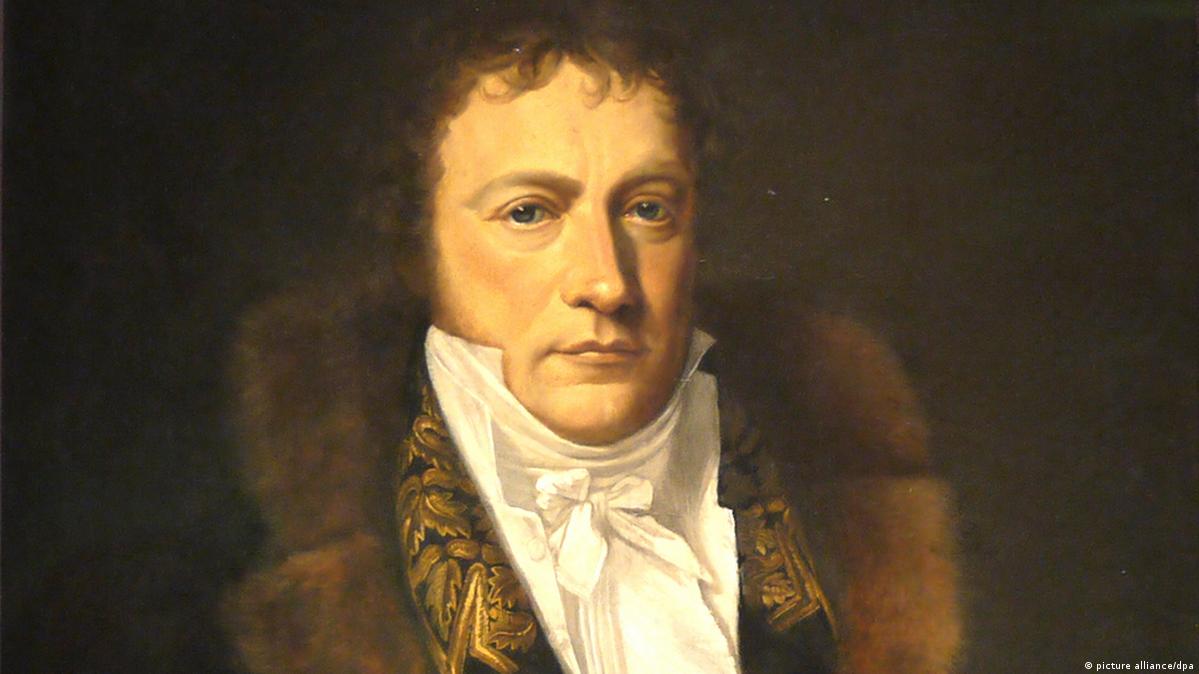馮洪堡 Wilhelm Von Humboldt (1767–1835) : 論語言On Language -
人類語言結構的多樣性及其對人類心理發展的影響 The Diversity Of Human Language-Structure And Its Influence On The Mental Development Of Mankind,
彼得希斯譯Translated By Peter Heath, 1988, p.59-61

馮洪堡 Wilhelm Von Humboldt (1767–1835)
正如沒有語言就不可能有任何概念一樣,心靈也不可能有任何對象,因為當然,只有透過概念,任何外在事物才能獲得意識的完整存在。
Just as no concept is possible without language, so also there can be no object for the mind, since it is only through the concept, of course, that anything external acquires full being for consciousness.
但主觀感知事物的整個模式必然會轉化為修養和語言的使用。 因為這個字就是從這種感知產生的; 它不是物體本身的複製品,而是意識中產生的物體形象的複製品。 由於所有客觀感知都不可避免地帶有主體性,因此我們可以將每個人類個體(即使不考慮語言)視為世界觀的獨特面向。 但透過語言,他變得更像一個人,因為正如我們稍後將看到的,透過其自身的附加意義,單字將自身構成了心靈的一個對象,並疊加了一個新的特徵。
But the whole mode of perceiving things subjectively necessarily passes over into cultivation and the use of language. For the word arises from this very perceiving; it is a copy, not of the object in itself, but of the image thereof produced in consciousness. Since all objective perception is inevitably tinged with subjectivity, we may consider every human individual, even apart from language, as a unique aspect of the world-view. But he becomes still more of one through language, since as we shall see later, by an added meaning of its own the word constitutes itself an object for the mind, and superimposes a new character.
透過後者,作為語音的特徵,在同一種語言中必然存在著普遍的類比。 由於類似的主體性也影響同一個國家的語言,因此每種語言都存在著一種獨特的世界觀。
Via the latter, qua character of a speech-sound, a pervasive analogy necessarily prevails in the same language; and since a like subjectivity also affects language in the same nation, there resides in every language a characteristic world-view.
正如個體聲音介於人與物體之間一樣,整個語言也介於人與內在和外在作用於他的自然之間。 他用聲音的世界包圍著自己,以便在自己的內心吸收和處理物體的世界。 這些表達絕不超出簡單真理的範圍。 事實上,人首先是與物體一起生活的,因為他的感覺和行動取決於他的呈現,他實際上是完全這樣做的,因為語言將它們呈現給他。
As the individual sound stands between man and the object, so the entire language steps in between him and the nature that operates, both inwardly and outwardly, upon him. He surrounds himself with a world of sounds, so as to assimilate and process within himself the world of objects. These expressions in no way outstrip the measure of the simple truth. Man lives primarily with objects, indeed, since feeling and acting in him depend on his presentations, he actually does so exclusively, as language presents them to him.
透過同樣的行為,他將語言從自身旋轉出來,他將自己旋轉到語言中,每一種語言都會將擁有它的人畫成一個圈子,只有立即跨入另一種語言的圈子才能退出。 因此,學習外語應該是在迄今為止所擁有的世界觀中獲得一種新的立場,事實上在某種程度上確實如此,因為每種語言都包含了人類一部分的整個概念結構和呈現方式。 但因為我們總是或多或少地繼承著自己的世界觀,甚至是我們自己的語言觀,所以這個結果並不是純粹、完全地經歷過的。
By the same act whereby he spins language out of himself, he spins himself into it, and every language draws about the people that possesses it a circle whence it is possible to exit only by stepping over at once into the circle of another one. To learn a foreign language should therefore be to acquire a new standpoint in the world-view hitherto possessed, and in fact to a certain extent is so, since every language contains the whole conceptual fabric and mode of presentation of a portion of mankind. But because we always carry over, more or less, our own world-view, and even our own language-view, this outcome is not purely and completely experienced.
即使是語言的起源也不應該被認為僅限於通常認為的那麼貧乏的單字,而不是在最初召喚自由人類社會的過程中尋找其起源,我們主要將其歸因於互助的需要,並將人類投射到一種想像的自然狀態。 這兩種觀點都是關於語言的最錯誤的觀點。
Even the beginnings of language should not be thought restricted to so meagre a stock of words as is commonly supposed when, instead of seeking its inception in the original summons to free human sociality, we attribute it primarily to the need for mutual assistance, and project mankind into an imagined state of nature. Both are among the most erroneous views that can be taken about language.
人並不那麼需要幫助,要提供幫助,不清晰的聲音就足夠了。 即使在其誕生之初,語言始終是人類的,並且不假思索地擴展到所有偶然感官知覺和內在關注的對象。 事實上,即使是所謂的野蠻人的語言(他們畢竟更接近這種自然狀態),也表現出豐富而多樣的表達方式,到處都超出了需要。 言語從胸中自由地湧出,沒有必要或有意,在任何沙漠中,很可能沒有流浪部落沒有自己的歌曲的。 對人類來說,作為一個物種,是一種歌唱的生物,儘管對他來說,音符也與思想結合在一起。
Man is not so needy, and to render assistance, unarticulated sounds would have sufficed. Even in its beginnings, language is human throughout, and is extended unthinkingly to all objects of casual sense perception and inner concern. Even the languages of so-called savages, who would have, after all, to come closer to such a state of nature, exhibit, in fact, a wealth and multiplicity of expressions that everywhere exceeds what is required. words well up freely from the breast, without necessity or intent, and there may well have been no wandering horde in any desert that did not already have its own songs. For man, as a species, is a singing creature, though the notes, in his case, are also coupled with thought.
但語言不只將自然中難以定義的眾多物質元素植入靈魂; 它也為後者提供了我們從整體形式中面對的東西。
But language does not merely implant an indefinable multitude of material elements out of nature into the soul; it also supplies the latter with that which confronts us from the totality as form.
大自然在我們面前展現出豐富多彩的色彩,從所有的感官印象來看,它呈現出多種形狀的多樣性,充滿了明亮的清晰度。 我們隨後的反思發現其中存在著與我們的心理模式相適應的規律性。 除了事物的肉體存在之外,它們的輪廓就像一種專為人類設計的魔法,具有外在的美,其中規律性和感官材料進入了一種對我們來說仍然無法解釋的聯盟,因為我們被它抓住並被它帶走。
Nature unfolds before us a many-hued and, by all sensory impressions, a many-shaped diversity, suffused with a luminous clarity. Our subsequent reflection discovers therein a regularity congenial to our mental pattern. Aside from the bodily existence of things, their outlines are clothed, like a magic intended for man alone, with external beauty, in which regularity and sensory material enter an alliance that still remains inexplicable to us, in that we are seized and carried away by it.
這一切我們都在語言內的類似和諧中再次發現,並且語言能夠描述它。 因為透過它進入一個聲音的世界,我們並沒有放棄我們周圍的世界。 語言自身結構的規律性與自然界的規律性相似; 因此,在激發人的最高和最人類力量的活動時,它本身也使人更接近於對自然的形式印象的理解,因為後者畢竟也可以被簡單地視為一種自然的形式印象的發展。 透過聲音特有的節奏和音樂形式,語言增強了自然之美的印象,將其轉移到另一個領域,但即使獨立於這個領域,也只是透過言語的節奏在靈魂的性情上發揮作用。
All this we find again in analogous harmonies within language, and language is able to depict it. For in passing, by means of it, into a world of sounds, we do not abandon the world that actually surrounds us. The regularity of language's own structure is akin to that of nature; and in thereby arousing man in the activity of his highest and most human powers, it also brings him closer, as such, to an understanding of the formal impress of nature, since, the latter, too, can after all be regarded simply as a development of mental powers. Through the rhythmical and musical form whose linkages are peculiar to sound, language enhances the impression of beauty in nature, transposing it into another sphere, but acts, even independently of this, through the mere cadence of speech upon the temper of the soul.
[Source: Wilhelm Von Humboldt: On Language - The Diversity Of Human Language-Structure And Its Influence On The Mental Development Of Mankind, Translated By Peter Heath, 1988, p.59-61]
